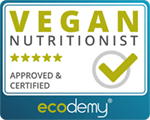Plant-Based v Vegan: What’s The Difference?
You’ve undoubtedly heard of both terms, plant-based and vegan, and then likely haven’t thought too much afterwards about the precise definitions for either. They’re so often interchanged, but does that mean that they are two different terms for the same thing? Not quite. While they are broadly similar, they are not identical.
What does “plant-based” mean?
The term “plant-based” was first coined back in 1980 by T. Colin Campbell while at the American National Institutes of Health, primarily studying the dietary benefits of vegetable intake in fighting cancer. [1] Campbell later went on to become a renowned proponent of plant-based dietary living.
A plant-based diet is one that entails a predominance of, unsurprisingly, plant-based foods. However, in this instance, a predominance is not an exclusivity. That’s because a plant-based diet does not proscribe the consumption of very small amounts of animal and animal related products – such as meat, dairy and eggs.
The Ethics
Further, a plant-based diet does not have an ethical imperative at its heart as is the case with veganism. The term “plant-based” originated in the scientific / nutritional community as a way to identify a “plant-heavy” diet that was neither fully devoid of animal products or, crucially, driven by the ethical requirement to be so devoid.
In contrast, a vegan diet is one that only allows for an exclusivity of non-animal or related food-stuffs. So, the small amounts of meat, dairy and eggs as with the plant-based diet would certainly be off the vegan menu.
What does “vegan” mean?
The term “vegan” was first coined by Donald Watson back in 1944 (Watson is sometimes referred to as the grand-father of veganism). From childhood into adulthood, Watson became increasingly dismayed about the humankind’s exploitation of non-human animals. While Watson saw some merit in vegetarianism, he didn’t think it went far enough. Watson wanted to take things further still and brought forth the modern concept of veganism that we know today – the complete absence of animal products and by-products from diet and other aspects of life.
Veganism also comes with an emphasis on avoiding the use of animal products for clothing (leather, silk and fur). While many plant-based adherents would not doubt also wish to avoid those items where possible, that aspect is not as integral to a plant-based diet as it is to a vegan one.
Today, the UK’s Vegan Society offers up this concise, contemporary definition of veganism on its website:
“A philosophy and way of living which seeks to exclude—as far as is possible and practicable—all forms of exploitation of, and cruelty to, animals for food, clothing or any other purpose; and by extension, promotes the development and use of animal-free alternatives for the benefit of animals, humans and the environment. In dietary terms it denotes the practice of dispensing with all products derived wholly or partly from animals.” [2]
Consequently, veganism’s complete abstinence from all animal products / by-products has its foundations grounded first and foremost in ethical considerations.
Despite these two different starting points for plant-based and vegan lifestyles (ethical and scientific), they do of course share a large amount of common ground. Primarily, both reject the notion that diets rich in meat, dairy and eggs (both non-vegan and non-plant-based) are beneficial to human health.
Plant-Based vs Vegan: Who’s right?
Unfortunately, the distinction between plant-based and vegan has caused some dispute and misunderstanding in recent years. That is unfortunate because however you choose to define yourself (if you so wish to), both dietary lifestyles offer up positive outcomes for non-human life, the environment and human health. That’s because both reject the idea that the widespread, regular consumption of animal products and by-products are in any way good for human health and also remotely sustainable for the finite resources of the world (which both certainly are not).
Bottom Line
Both definitions share way too much common ground for either “side” in any debate between the two to become too high and mighty. For example, from a vegan perspective, a plant-based diet has to be immeasurably preferable to a more “regular” omnivorous diet as still practices by the majority of the world’s population. A simplistic “black and white” approach to this, like so many other issues in life, does not really work. From a vegan perspective, if a plant-based diet ultimately leads to a vegan one in time, that surely has to be a good thing. Some progress is always better than no progress, right?
Therefore, when it comes to the key challenges of the twenty-first century, such as health and environmental protection and sustainability, the fact that there is a relatively minor difference between the two terms should be of little to no significance. Anything else really is nothing more than a case of splitting hairs over dictionary definitions.
[2] https://www.vegansociety.com/go-vegan/definition-veganism




